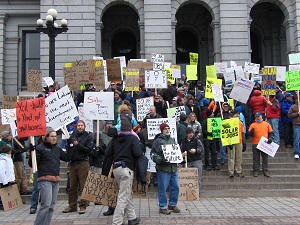Public Utilities Commission to meet tomorrow to discuss Xcel proposal
 Tomorrow, March 4. The Colorado Public Utilities Commission will meet to discuss whether Xcel should be allowed to reduce its Solar Rewards rebate from the current $2.01 per watt to $1.25 per watt.
Tomorrow, March 4. The Colorado Public Utilities Commission will meet to discuss whether Xcel should be allowed to reduce its Solar Rewards rebate from the current $2.01 per watt to $1.25 per watt.
Two weeks ago, Xcel announced that it was reducing the solar program from $2.35 per watt to $2.01 per watt. Twenty-four hours after that announcement, Xcel effectively froze the rebate, which drew much protest from Colorado solar installers, workers, and the Colorado Solar Energy Industries Association (COSEIA).
“There is no solar program today. The solar marketplace in Xcel territory is frozen,” said COSEIA Executive Director Neal Lurie. “When customers hear that a utility rebate is temporarily unavailable, they wait for it to restart, which effective freezes the solar market. That has led many investors in solar companies not to invest.”
If the CPUC signs off on the proposal, Xcel will be paying $1 in REC payments and $.25 in rebates per watt.
Xcel spokesperson Michelle Aguayo told Clean Energy Authority on Feb. 17 that the Colorado solar market has grown too fast for the utility to keep up.
Aguayo said that the company expects to pay out $97 million in solar rebates this year.
Yesterday, Colorado installers and Xcel representatives spoke during a Colorado Senate hearing. According to Lurie, it got personal for some speakers.
“There was some really emotional testimony from stakeholders,” he said. “They talked about their own respective companies. In some cases they already had to lay off workers.”
But Aguayo, in an email today, questioned the validity of the recent news of solar-company layoffs.
"There are 2,200 systems, 37 megawatts, approved for installation. These are systems that were approved last year for installation in 2011. An additional 6 megawatts of solar power has been approved for installation since Jan. 1 for a total of 43 megawatts of solar power," she wrote. "With that much work already approved, the question would be: Why are workers being laid off?"
Aguayo said that once the CPUC approves Xcel's proposal, there is another 10 megawatts of solar projects that are slated for the program.
Xcel has long asserted that the rebate’s function is to ratchet down as the cost of solar lowers. But solar industry members in Colorado say that Xcel’s proposal leaves installers in a dangerous place, unable to predict when the rebate will reduce.
That uncertainty is centered on the relationship between the REC payment and rebate amount. Xcel only has to seek approval from the CPUC if it reduces the rebate amount, not the REC payment.
But Lurie contends that if the CPUC approves Xcel’s reduction, the utility would effectively be allowed to reduce REC payments, the majority of the payout in that case, without having to seek approval from the Commission.
“That’s very troubling,” said Lurie. “No one is looking for rebates forever, but we want to be able to plan accordingly. Having a predictable schedule is important. We thought we had that schedule. We agreed upon it: Xcel agreed upon it.”
The Commission meets tomorrow at 11 a.m. in Denver, Colo. COSEIA will be in attendance and proposing its Market Stabilization Plan to unfreeze the Solar Rewards program while the CPUC makes a decision, which Lurie said could be months.
Aguayo said that the request to "unfreeze" the rebate simply does not provide a method for the industry itself to manage the growth and cost of the program.
COSEIA's proposal does address this, albeit not in detail.
"To ensure program stability, the new schedule to ratchet down incentives should explore options that improve program cash flow including performance-based incentives and other incentive mechanisms," stated COSEIA's website.
Both parties will be debating this very issue tomorrow at the CPUC meeting. If it's anything like yesterday's, expect some passionate statements and sentiments of panic. But, according to Aguayo, there's nothing new about the passion and fear that's sure to be expressed tomorrow. She's heard it all before.
"In 2009, when Xcel Energy implemented the changes to the Solar Rewards program that instituted a ratcheted down process for the incentives, members of the solar-installation industry made the same claims that the changes would kill the industry," she wrote. "That did not happen. Instead, the industry saw tremendous growth, including a 91-percent growth last year alone, according to the Colorado Solar Energy Industries Association.
"The ratcheted decrease in incentives was a responsible means of managing the funds used to pay for Solar Rewards and other renewable energies," she said, "but one that couldn’t support the growth the industry has continued to see."
To read COSEIA’s plan, check out the association’s website.
For a look at Xcel's proposal, click here.



